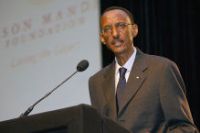
Paul Kagame.
(Image: Nelson Mandela Foundation)March 20, 2009 – Rwanda’s President Paul Kagame opened the Nelson Mandela Foundation’s Promise of Leadership dialogue today with a keynote address highlighting the need for leadership in Africa to tackle the challenges facing the continent.
Held at the Helderfontein Estate, on the outskirts of Johannesburg, the two-day dialogue aims to examine the role of leadership in addressing these challenges. Past, present and future leaders from government, business and other areas of society all over Africa are meeting to talk about accountable and inclusive leadership.
According to the Rwandan president, the challenges include the lack of a cohesive leadership strategy, an over-reliance on foreign aid and a failure to realise Africa’s economic potential.
The CEO of the Nelson Mandela Foundation, Achmat Dangor, opened the dialogue before Foundation trustee Tokyo Sexwale introduced the keynote speaker Rwandan President Paul Kagame, who delivered his address entitled “From Conflict to Reconstruction and Development: Rwanda’s Story”.
South African business magnate Sexwale spoke of the particular challenge of violence, whether it be crime or civil unrest. Sexwale urged the participants in the dialogue to take lessons from the example set by Nelson Mandela.
In Sexwale’s speech he described Mr Mandela as a “diamond” with many facets, which he said was a necessary trait when it came to conflict resolution.
“He had a way of disarming his opponents,” said Sexwale. In the midst of conflict, he looked for the best in people and had the ability to be firm and stay focused, both “tactically and strategically”.
Sexwale described Mr Mandela as having a rare ability to find reconciliation.
“One never negotiates with friends; one does so with enemies,” said Sexwale, quoting Mr Mandela.
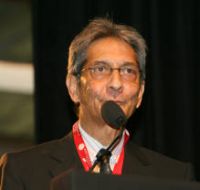
Achmat Dangor.
(Image: Nelson Mandela Foundation)Sexwale encouraged Kagame to share the lessons he had learnt as the leader of his troubled country.
In his keynote address Kagame expressed his gratitude for the opportunity to exchange views with such distinguished delegates at the dialogue.
“As we continue to steer our continent on a more productive path, let us continue to stimulate peace,” Kagame said.
He described Rwanda’s efforts at nation-building as a considerable success in recent years.
“Positive changes on our continent continue to be realised,” he said.
Kagame also praised the significant economic growth of some African countries.
The Rwandan president, however, had a note of warning, pointing out that Africa was nowhere near realising its potential. He mentioned Africa’s great “latent wealth” and the need for leaders to turn that wealth into a reality.
“Our continent is still not where it should be,” he argued, citing the need for African voices to be heard internationally, while African leaders, he stated, needed to transform the continent from one reliant on international aid to one with stable, sustainable, autonomous economies.
“There is no reason why we Africans cannot stand on our own feet,” he added.
Kagame said the situation in Rwanda was “challenging but rewarding”, before guiding the members of the dialogue through the process that had taken place after the genocide.
Eight political parties were brought in to steer Rwanda through the immediate post-genocide era, setting the scene for the first democratic elections. This provided peace and security, allowing the government to develop the key strategic leadership values that he felt were crucial in guiding the country through that troubled time.
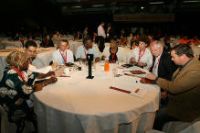
Roundtable discussion.
(Image: Nelson Mandela Foundtaion)The strategy for developing effective leaders in Rwanda, Kagame said, had five key points: one, it had to be inclusive to ensure that all voices were heard to provide input in the development process. Two, there had to be a vision to transform the economic situation, ensuring improved quality of life of “our otherwise impoverished nation”. Three, it had to have the proper ideological mindset, one that rejected defeatist perceptions of Rwanda as an economy. Four, leadership had to be part of the people and could not raise itself above the people. Five, leadership had to be constantly reviewed to ensure that it was living up to its promises.
Kagame highlighted how Rwanda, which had been almost 100% reliant on foreign aid after the genocide, had reduced that need for foreign aid to around 45%.
Dangor, in thanking the President, said that Kagame had set the context for the discussion for the next two days, highlighting the fact that Africa’s problems are not insurmountable.
Reflections:
Lucky Madonsela, Cida City Campus graduate
It was a very good opening. It set the tone; at the end of the day it all about us.
Next time I would like to be able to engage with the leaders on a personal level. Young people are not being heard and no one speaks our language. There is a lack of participation. So next time I would like more time with guest speakers.
I came here because I believe in what Stephen Covey said in his book Seven Habits of Highly Effective People: “Seek to understand before you can be understood.”
Precious Magagodi, Hope Africa programme co-ordinator
It’s good to know more about Rwanda, given the history of how they have overcome their obstacles. I wanted to know more about the specific programmes put in place, also from a psychological point of view.
I was interested in the healing process because I feel it’s important for us to learn from those processes. We are 15 years into democracy yet each day we still experience segregation. It would have been great if he had spoken about those processes.
Lynette Mudekunye, Save the Children programme director
What interested me was the different kind of Constitution that they have in Rwanda. The president has given us a lot of food for thought. Maybe if we had more women in our leadership we would do things better.
Click to download President Kagame’s keynote speech (in PDF format).
Click to download Tokyo Sexwale’s welcoming speech (in PDF format).
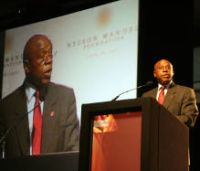
Tokyo Sexwale.
(Image: Nelson Mandela Foundation)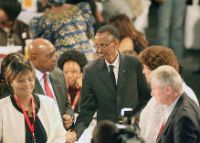
Paul Kagame.
(Image: Nelson Mandela Foundation)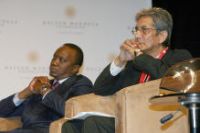
Delegates.
(Image: Nelson Mandela Foundation)